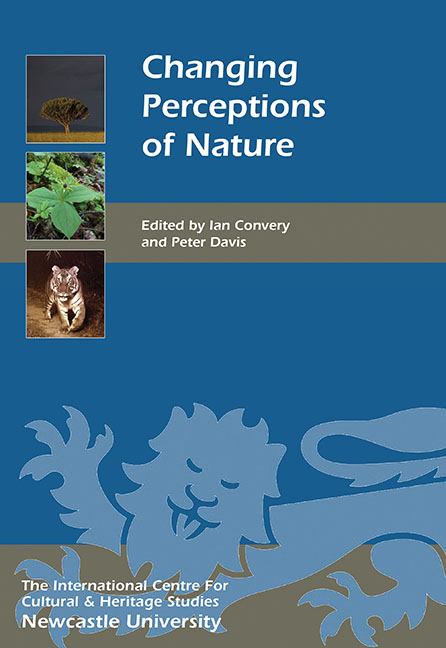Book contents
- Frontmatter
- Contents
- List of Illustrations
- Acknowledgments
- List of Abbreviations
- Foreword
- Introduction
- HISTORICAL PERSPECTIVES ON NATURE
- 1 ‘The Nomination of the Visible’: William Turner's Practice of Natural History
- 2 Early European Perceptions of the Nature of Australia
- 3 Conserving Natural Heritage: Shifting Positions of Culture and Nature
- 4 Three Birds of a Feather – Darwin, Wallace and Attenborough: An Unbroken Tradition of Finding Where the Wild Things Are
- 5 Organising, Naming and Ordering Nature
- 6 Our ‘Great Entail’: Constructing the Cultural Value of the Lake District
- COLLECTING NATURE
- INTERPRETING NATURE AND LANDSCAPES
- CONSERVING NATURE
- PEOPLE–NATURE INTERACTIONS
- List of Contributors
- Index
- Miscellaneous Endmatter
1 - ‘The Nomination of the Visible’: William Turner's Practice of Natural History
from HISTORICAL PERSPECTIVES ON NATURE
Published online by Cambridge University Press: 26 October 2017
- Frontmatter
- Contents
- List of Illustrations
- Acknowledgments
- List of Abbreviations
- Foreword
- Introduction
- HISTORICAL PERSPECTIVES ON NATURE
- 1 ‘The Nomination of the Visible’: William Turner's Practice of Natural History
- 2 Early European Perceptions of the Nature of Australia
- 3 Conserving Natural Heritage: Shifting Positions of Culture and Nature
- 4 Three Birds of a Feather – Darwin, Wallace and Attenborough: An Unbroken Tradition of Finding Where the Wild Things Are
- 5 Organising, Naming and Ordering Nature
- 6 Our ‘Great Entail’: Constructing the Cultural Value of the Lake District
- COLLECTING NATURE
- INTERPRETING NATURE AND LANDSCAPES
- CONSERVING NATURE
- PEOPLE–NATURE INTERACTIONS
- List of Contributors
- Index
- Miscellaneous Endmatter
Summary
William Turner (c. 1508–1568) was born in Morpeth, probably the son of a local tanner. He left Northumberland in 1526 to go to Cambridge to study ‘physic’ (the sixteenth-century term for medicine), then finished his studies in Northern Italy while in exile under Henry VIII. After travelling through Switzerland and up the Rhine, he spent four years as court physician at Emden in East Friesland. He returned to England with the accession of Edward VI in 1547, becoming physician to Protector Somerset, but after only a few years he changed career to become Dean of Wells, a position he had to vacate when Mary Tudor came to the throne. He returned from a second exile on the continent at the accession of Elizabeth, under whom he regained his post at Wells, though he spent his last years, sick and in pain, residing in London. His life, therefore, was in part determined by the upheavals taking place in the reigns of the Tudors, but it had as its outcome works in natural history unlike any which had gone before, written at a time when the perception of nature was changing across Europe in different ways as a result of different types of scholarship, including his own.
In 1543 the Nuremberg printer-publisher Johanes Petreius published the work of a dying Polish physician: Nicholas Copernicus’ De Revolutionibus. A year later, the Cologne publisherprinter Johannes Gymnicus published the work of an exiled English physician: William Turner's Avium Praecipuarum apud Plinium et Aristotelem mentio est, breuis & succincta historia. Copernicus would never see how, within about 50 years, his work would instigate a fundamental conceptual change in international scholarship on how the universe operated, based on acceptance of his insistence on the importance of a mathematical model. Turner's work was influential, eventually, mainly in England, where it enabled a diligent observer to expand details of the creatures filling the space of this world without in any way contradicting the conceptual framework of Aristotelian authority. These two works, both seen as contributing to what is referred to as ‘the scientific revolution’, polarise the study of Nature in the sixteenth century.
- Type
- Chapter
- Information
- Changing Perceptions of Nature , pp. 7 - 16Publisher: Boydell & BrewerPrint publication year: 2016



